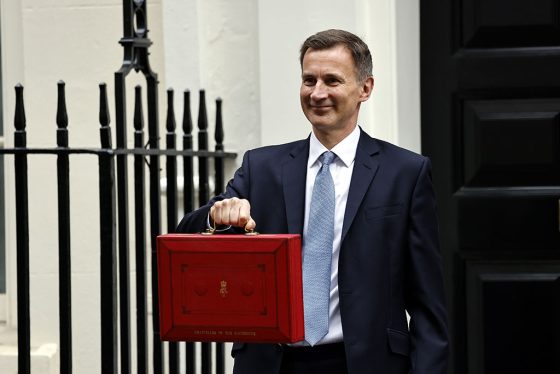The Chancellor of the Exchequer Jeremy Hunt has just made what should be his last Budget Statement before the General Election. While the headline announcements concerned the cutting of the National Insurance rate by 2p in the pound, changes to Child Benefit and an ending to the current ‘non-dom’ tax regime, there were some property-related measures revealed as well.
Maunder Taylor, a commercial property manager in Barnet and across North London, take a keen interest in all property-related issues, particularly as they could affect investors, landlords and tenants. Here we outline the key housing takeaways from last week’s Budget.

Capital Gains Tax Rates
The higher rate of tax paid on profits from selling property has been cut from 28% to 24%. Note that this only applies to higher and additional-rate taxpayers; if you are a basic rate taxpayer, you will still only pay 18% on any capital gains (in excess of your annual allowance) you make in any financial year.
Whatever your current tax bracket, any capital gains will be added to your other income when calculating your income tax band for the year, so this may push you into a higher bracket.
This measure (the cut from 28 to 24%) is scheduled to be introduced in April. The Treasury hopes this will encourage landlords and second homeowners to sell their properties, making more available for a variety of buyers, including those looking to get on the housing ladder for the first time. However, it remains to be seen whether a 4% change will achieve this desired effect.
The End of Multiple Dwellings Stamp Duty Relief
Multiple dwellings stamp duty relief was designed to support investment in the private rented sector. It was hoped that needing to pay less stamp duty would lead to landlords investing in more homes, which they could then rent out to tenants in a long-term arrangement.
However, after a review into the existing legislation found that the relief isn’t being used in this way, the government have decided to abolish this relief (in England and Northern Ireland) from June this year. Mr Hunt, pictured above, said there was evidence the relief was being ‘regularly abused’.
Holiday Lets
Mr Hunt announced that the current arrangements regarding furnished holiday let (FHL) properties will be scrapped; owners and landlords will no longer benefit from the tax breaks they currently enjoy.
For instance, landlords can deduct the full cost of mortgage interest payments from their rental income and pay lower capital gains tax if they sell up. To qualify, the properties must be available for holiday letting for at least 210 days a year, and which are let for at least half that time.
The Chancellor’s decision to axe this relief is aimed at encouraging more landlords to sell up, and boosting the supply of homes available for rent, particularly in seaside towns and villages. However, this measure – which is expected to save the Treasury just under £250 million by 2028-29 – isn’t due to come into effect until April 2025.
Maunder Taylor – a Commercial Property Manager in Barnet and North London
As well as being a commercial property manager, Maunder Taylor offers a range of other services to clients.
If you want to buy or sell a home, let it out to someone or invest in commercial premises, we have a department which can help you. Our legal team can also assist you if you have a property-related dispute which you cannot resolve, whether you are a leaseholder, landlord or tenant. And we also have a dedicated team which provides residential block management services in Watford, St Albans, and throughout Hertfordshire and North London.
If you would like to know more about any of our services, follow this link and fill in the online form; you can also call our Whetstone office on 020 8446 0011 or our Potters Bar office 01707 665 666 for any residential management queries.